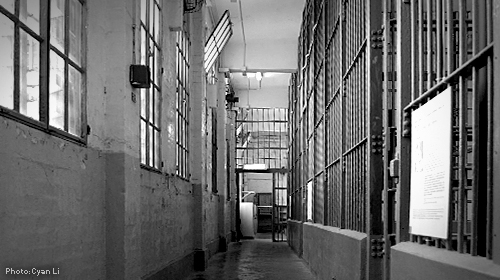
Today a federal judge in Montgomery, Alabama entered a historic decision in the quarter-century-old fight for equality for prisoners living with HIV. It’s the culmination of a month-long trial in a class-action lawsuit by the ACLU that put Alabama’s discriminatory and dehumanizing treatment of prisoners with HIV under a national spotlight.
Driven by stubborn prejudice and willful ignorance, Alabama has been categorically excluding prisoners with HIV from a host of rehabilitative, educational, trade skills and vocational programs—even barring those with serious mental health needs and substance abuse problems from critically important treatment programs. Alabama houses them in HIV-only dormitories, and forces all male prisoners with HIV to wear a white wrist-band night and day—a latter-day yellow star.
Today’s decision will end all that. In a blistering opinion, Judge Myron H. Thompson ruled that Alabama’s HIV segregation policies violate the Americans with Disabilities Act. Thompson said in his decision: “It is evident that, while the ADOC’s categorical segregation policy has been an unnecessary tool for preventing the transmission of HIV, it has been an effective one for humiliating and isolating prisoners living with the disease.”
The trial exposed that Alabama’s HIV segregation policy has been driven by a toxic mix of ignorance and prejudice at the highest levels of the Department of Corrections.
One prison warden testified that he doesn’t know whether HIV can be transmitted through food. Another assumed that all prisoners with HIV are gay. The state’s opinion pollster testified that homosexuality is a “lifestyle” and “choice” that “creates the opportunity for diseases, including HIV, to be spread,” and that correctional staff would refuse to prevent attacks on HIV-positive prisoners. The judge pointedly remarked that using that logic, Alabama would never have achieved racial integration. (In fact, the impact of the HIV segregation policy is far greater on black than on white prisoners: more than 80 percent of Alabama prisoners with HIV are African-American.)
Alabama officials claimed that HIV segregation is a “benevolent” policy: Forcibly outing prisoners’ HIV status helps get them over their “dread of disclosure.” The prisoners exposed that hypocrisy, describing in graphic detail what it’s really like to be treated like lepers and “tagged like cattle.” After visiting the women’s prison, Judge Thompson stated the HIV dorm is tantamount to solitary confinement, and its atmosphere of depression “almost palpable.”
When the judge visited the HIV dorm at the men’s prison, he was greeted by a message on a blackboard: “Please desegregate us!” But even Alabama prisoners who don’t have HIV understood the lawsuit as a civil-rights struggle that helps them all. Plaintiff Dana Harley testified that when a local TV station aired an interview with her protesting HIV segregation, general population inmates “started applauding and cheering, and you know, saying that they’d seen the news interview, and high-fiving. You would have thought—well, all of us was being released the way their response to it was.”
Alabama claimed at trial that prisoners who don’t have HIV would react violently if the HIV segregation policy were ended. But the Department of Corrections’ own associate commissioner for security dealt a death blow to that defense — and stunned the courtroom — by suddenly admitting on cross-examination that he has now come to believe that HIV segregation is unjustified.
The decision today is a milestone in the ACLU’s campaign to end HIV segregation in the Deep South, through litigation, negotiation, and public education. By the late 1990’s, Alabama, Mississippi, and South Carolina were the last states in the nation to segregate. In 2010, Mississippi completely abandoned HIV segregation under pressure of a scathing report by the ACLU and Human Rights Watch. With today’s decision, South Carolina becomes the sole standard-bearer for this shameful remnant of the era of HIV hysteria.
We don’t know yet whether Alabama will appeal Judge Thompson’s decision. But it’s clear the days of HIV segregation are numbered. Alabama prisoners, supported by allies around the state, the nation and the world, won’t give up this struggle until they’ve finally put an end to the state’s discriminatory practices. Today’s decision is an enormous step toward that goal.
See Henderson et al. v. Thomas et al. for more information on the case.
Learn more about HIV/AIDS discrimination in prisons: Sign up for breaking news alerts, follow us on Twitter, and like us on Facebook.


